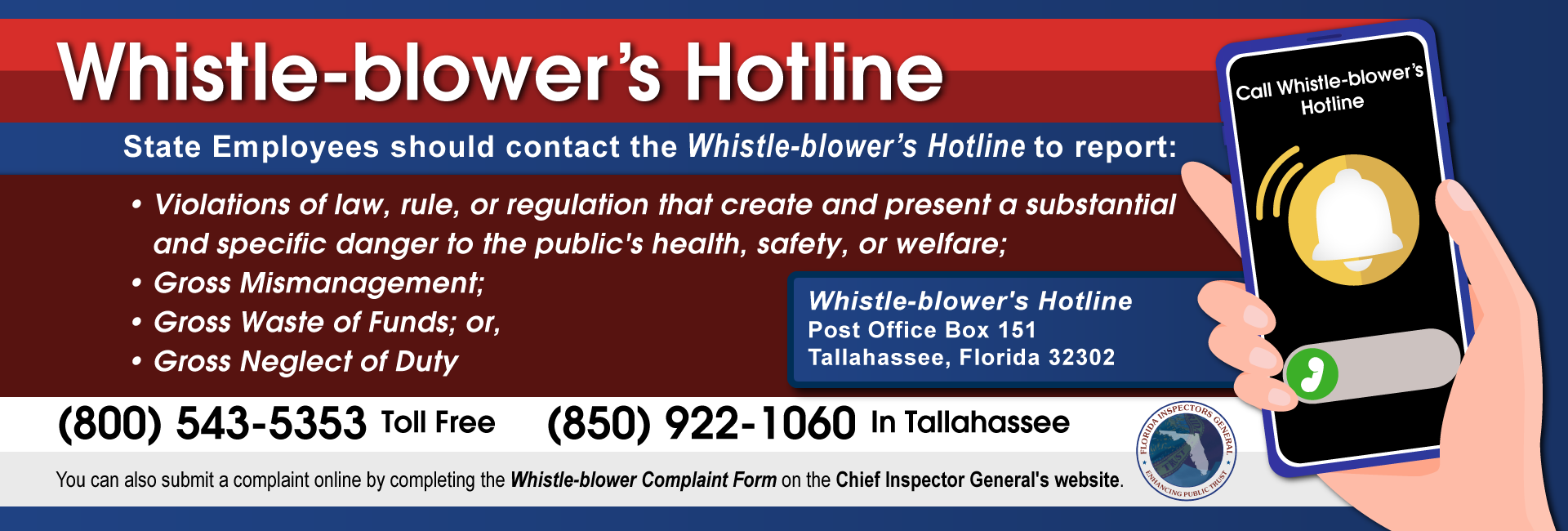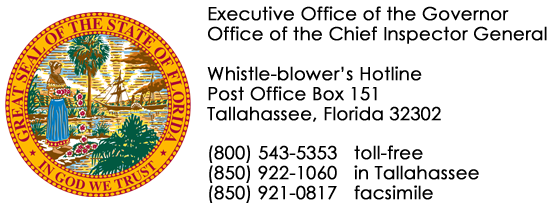 |
|||
|
|
|||
|
State employees who blow the whistle on fraud and abuse within state government are protected by law. Sections 112.3187 - 112.31895, Florida Statutes (F.S.), constitute the law known as the "Whistle-blower's Act." These and other Florida Statutes can be viewed on the official internet site of the Florida Legislature at www.leg.state.fl.us. The legislative intent of the Whistle-blower's Act is to prevent agencies or independent contractors from taking retaliatory action against an employee who reports agency violations of law that create a substantial and specific danger to the public's health, safety, or welfare. It is also the intent of the Legislature to prevent agencies or independent contractors from taking retaliatory action against an employee who discloses information alleging improper use of governmental office, gross waste of funds, or any other abuse or gross neglect of duty on the part of an agency, public officer, or employee.
Why have a
Hotline? Who should call the Hotline? "Agency" means any state, regional, county, local, or municipal government entity, whether executive, judicial, or legislative; any official, officer, department, division, bureau, commission, authority, or political subdivision therein; or any public school, community college, or state university. [Note: For disclosures concerning a local government entity, including any regional, county, or municipal entity, special district, community college district, or school district or any political subdivision of any of the foregoing, the information must be disclosed to a chief executive officer as defined in §§ 447.203(9), F.S., or other appropriate official.] "Independent contractor" means a person, other than an agency, engaged in any business and who enters into a contract, including a provider agreement, with an agency. What should be reported? (a) Any violation or suspected violation of any federal, state, or local law, rule, or regulation committed by an employee or agent of an agency or independent contractor which creates and presents a substantial and specific danger to the public's health, safety, or welfare. (b) Any act or suspected act of gross mismanagement, malfeasance, misfeasance, gross waste of public funds, suspected or actual Medicaid fraud or abuse, or gross neglect of duty committed by an employee or agent of an agency or independent contractor. What happens when I call? How do you investigate? How are my rights protected? You can also submit a complaint online by completing the Whistle-blower Complaint Form on the Chief Inspector General's website. 
If you are an employee of a state agency, you disclose information under the Whistle-blower's Act, and that disclosure results in alleged retaliation by an employer in the form of an adverse personnel action, you may file a written complaint with the Florida Commission on Human Relations (FCHR) no later than 60 days after the prohibited personnel action. You can contact the FCHR by calling (800) 342-8170 or by writing to the following address:  "State agency" or "agency" means any official, officer, commission, board, authority, council, committee, or department of the executive branch of state government. For purposes of this chapter and Chapter 215 F.S., "state agency" or "agency" includes, but is not limited to, state attorneys, public defenders, the capital collateral regional counsels, the Justice Administrative Commission, the Florida Housing Finance Corporation, and the Florida Public Service Commission. Any other person protected by the Whistle-blower's Act may, after exhausting all available contractual or administrative remedies, bring a civil action in any court of competent jurisdiction within 180 days after the action prohibited by the Whistle-blower's Act.
 |
|||
|
Connect with a state agency or the Chief Inspector General on our Contact Page. |
|||
| Privacy Policy | Site Map | ||
